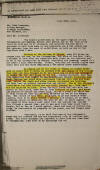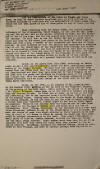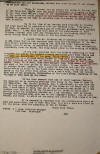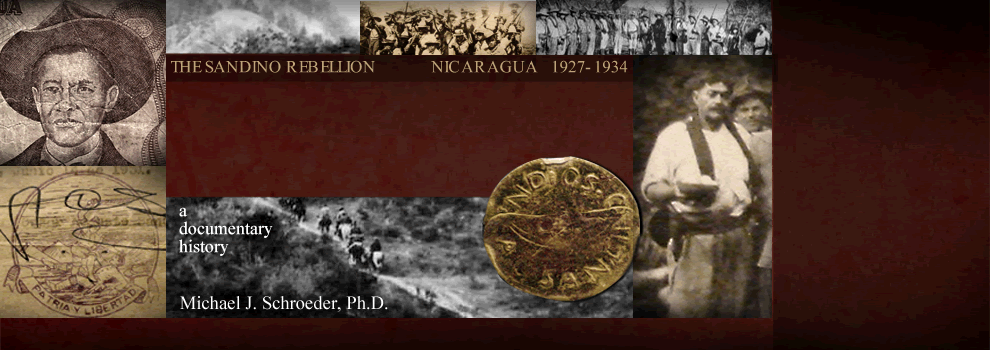|
 Nicaraguan
Bandits. Nicaraguan
Bandits.
July 25th, 1931.
Mr. John Brownson,
Acting Manager,
Foreign Department,
New Orleans, La.
Dear Mr. Brownson:
The bandit activities in the upper
regions of the Prinzapolka and Bambana
Rivers just before and at the time of my
visit on both may be of interest, and
herewith follows what I gathered on both
from some of the residents and a few
others who had returned from the seat of
activities, as well as one or two
fugitives whom I met.
Getting to the village of Tungla, some
115 miles up-stream from the sea, on the
Prinzapolka, the noon of the 3rd. Inst.,
I decided to look over the immediate
back lands in the vicinity and so we (I
was accompanied by Messrs. Donaldson and
Leeming) camped in a hut about a mile
down-stream. Friday, Saturday and Sunday
nights were spent here and the three
following a few miles lower down-stream.
On coming out of the woods at Tungla on
Sunday afternoon at about four o’clock,
we learned from the people of the
village that news had been brought in by
the first one of five men belonging to
Tungla who had left Siuna on the 3rd.,
coming overland, that bandits numbering
from eighty to one-hundred-and twenty,
including some Wanki Indians had eight
days previously visited that town and
also Uani, raided the shops and other
places, destroyed one building and were
bent on general destruction and murder.
Two of the village’s inhabitants had
been killed and one badly chopped up –
this last was not expected to live.
After the main force had left with the
spoils of their raid, some few of them
returned to Siuna, got drunk and started
to molest the women folk, and as a
result of which two of them (bandits)
were killed with machetes by two of the
Tungla men. The others of this small
gang left to go and consult their
leaders, said to be Ramon Rivera –
Caracas and others, as to what reprisals
should be taken for the loss of two of
their number. It was reported more than
a week later that the bandits had
visited this village a second time, and
it was said that they would visit
Tungla, but as far as I could gather,
there had been no further killings, or
destruction of property to the place,
nor had Tungla been visited.
Curiously, it is said that one of the
Chinamen’s shops was not cleared out and
it was apparently left to continue
business. The other Chinamen are
reported to have fled and come down to
Prinzapolka; some five to my knowledge
did so.
 p.
2 p.
2
All the inhabitants of the river at
Tungla and lower down, as well as those
further up-stream were greatly worried
at the reported killings of civilians
and the molestation of their women folk,
which did not take place in any of those
parts on any of their previous raids.
When returning down the Yauya Creek, the
second largest tributary of the
Prinzapolka, below Tungla, on the 15th
we (Mr. Leeming and the writer) met an
old miner, Peterson by name, who was
watchman at the La Luz Mine, and who has
passed many years in that part of the
country. He said that he and his family
had had to leave their house and take to
the woods just prior to the bandits’
first visit to Siuna and that a man, a
member of his household had been one of
those killed. He also informed me that
the bandits had apparently a complete
list of all the inhabitants of any
importance both foreign and native in
the surrounding country, and that he
understood that none of these were to be
spared if they got into the hands of the
bandits. He mentioned that most of the
inhabitants of the villages in that part
of the country had been seeking refuge
hidden in woods as it was claimed that
the bandits were bent on a general
destruction of both life and property.
Later, on the above data (the 15th)
returning to Tasbapowni we met a man
called Lawrence, about the most
intelligent negro member of the Tungla
village. He said that the latest reports
from around Uani and Siuna were that the
bandit gang numbered between three and
four-hundred and that they were expected
to visit Tungla; so he had fled with his
goods and chattels as likewise many of
the others, and I might say, that the
exodus from this village commenced on
the Sunday afternoon that we first
learnt of the first raid on the two
towns above mentioned.
Later, on the 17th, I, in company of Mr.
Leeming went up the Bambana River
getting as far up this as the Walpatera
Rapids, on the morning of the 18th inst.
While enroute, we called in to see a Mr.
Albert Kirkland, whose home is at the
junction between the Banacruz and
Bambana Rivers. We found him at home, as
he had on the Tuesday previously, due to
the reported bandit activities, left his
post at the Neptune Mine. Having once
been in the hands of these people and
having escaped, he did not wish to run
the risk of being captured a second time
and, therefore, wished to get as far out
of their reach as possible. While on his
journey from the mine he had to pass
Tuesday night in the village of Tunkey
some 145 miles from the sea at
Prinzapolka. Next morning, Wednesday, he
was informed by his host that three
strangers; unknown to any of the
inhabitants of the villages, had made
the rounds of same that night winding up
their inspection by sitting in front of
the house in which he passed the night
and were overheard in subdued
conversation by his host. That night
(Wednesday) a small party of bandits,
number unknown, visited the town and
raided the few small shops therein.
Their number must have been few as it is
reported that loot they could not carry
away they strewed in the so called
streets. Curiously, likewise the Neptune
Bodega, which is situated at this
village, and said to contain perhaps
some $4,000.00 in
 p.
3 p.
3
merchandise was not destroyed, neither
was there damage to any property of life
there.
This, of course, was my reason for going
no further than to the Walpatera Rapids
some two hours from Tunkey, or roughly
15 miles. It was also reported that many
of the inhabitants of Tunkey had taken
to the woods and other people of the
surrounding country had come down-stream
to get as far away as possible from the
center of activities in this district.
Up to the time of my leaving this
vicinity no trouble had been reported in
connection with the Neptune Mine. This
mine, I am told, is guarded (10 Guardia
and 25 civilian guardsmen with machine
guns, etc.). I may also say that some of
the shopkeepers of this village (Tunkey)
also left for Prinzapolka on the morning
after the raid; having taken to the
woods on the day previously.
I learnt from Mr. Kirkland while
spending Saturday night in his house
that he had received news from the
storekeeper of the Neptune Mine’s
storeroom that bandits had left for
their headquarters, Bocay, with 18
boats, 12 mules and 30 head of cattle.
This information, apparently from the
mines, was dispatched prior to the
raiding of Tunkey.
It was also reported that the bandits
operating in this vicinity and led by
the leaders already mentioned plus some
others and the Official Executioner of
the gang, Julio Castro, are making their
headquarters in a village being formed
by them at a place called Asa, at the
junction of Uli and Asa Rivers, both
tributaries of the Prinzapolka. Here, it
is said, they have amongst them both
women and children and much of the loot
gotten in their recent raids. It was
reported, or perhaps better rumored,
that a party of bandits had left for
their headquarters at Bocay on the Wanks
River where they can easily get by going
up the Uli River from which, with a
day’s walk, they can connect with one of
the principle tributaries of the river
Bocay, emptying a the village of this
name on the Wanks.
It was also rumored that one of their
leaders, Pedron, was supposed to be
crossing overland from Bocay to the town
of Rama on the Escondido. The leader,
Caracas, was, I understand, at one time
and not so long ago a timekeeper of one
of the Farms on the Vance Tract and who,
I have heard it said, was one of the
principle men mixed up in the trouble
that took place in the district in the
raids of April past. Shortly after the
occurrence alluded to, I am informed,
that he passed through the Neptune Mine
with two of the Company’s mules. One he
left behind, and which is still at the
mine; the other he took along with him.
It is generally reported that the
bandits were short of arms and
ammunition, and to bear this out, that
not a shot was fired in all the raids,
with the exception of two at Tunkey.
Yours very truly,
f-M:MD C C
Actg. Division Manager
(written) Nicaragua
FFM
RG80, Sec. Navy Gen. Correspondence, 1925-40,
EF-49, Box 2008.
Transcribed by Pleet Initiative-funded
Lebanon Valley College
student-researcher Nicholas J. Quadrini.
|

